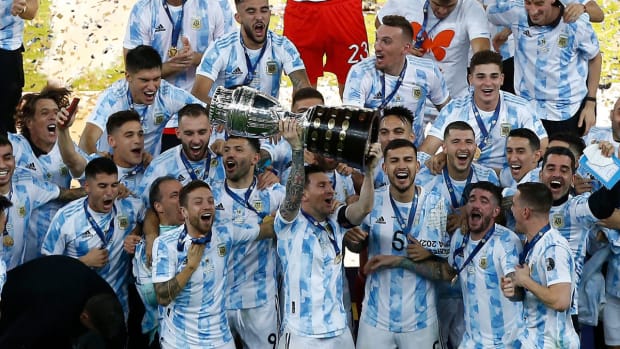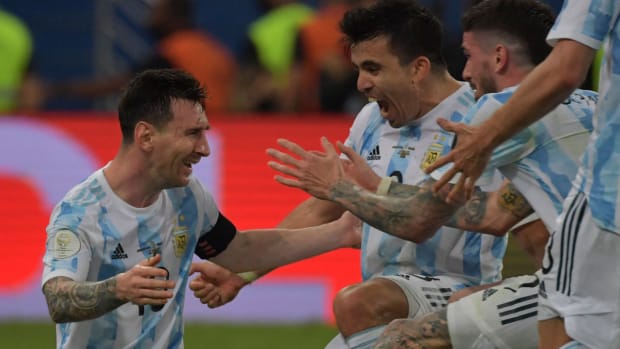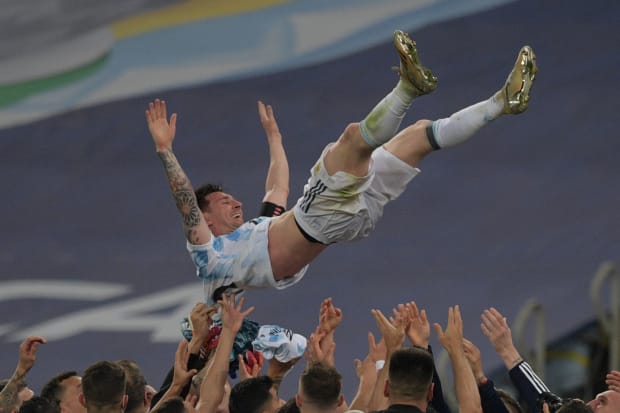Argentina has ended its trophy drought and reclaimed its place atop South America—and Lionel Messi has an emphatic response for whatever critics of his remained.
It was a moment that would have made any Argentina fan immediately conjure the ghosts of finals past, at least those over the last 28 years.
In the 88th minute of the Copa América final and Argentina leading Brazil by a single goal, Lionel Messi found himself 1-v-1 with the goalkeeper, five yards out, with a chance to ice it. If ever any player deserved that moment, it was him. And it's a goal he scores without thinking twice every time. Except this time. Messi slipped. This final, the missed chance was on him if it came back to bite Argentina in the waning moments.
This time, however, was different all around.
At long last, there's no sulking and walking by a trophy he won't be lifting. There's no more consolation prize in the form of a golden ball. There are no more post-match tears and questions about international retirement. No more answering for a federation that failed to do right.
Argentina's trophy drought is over. Messi's gaping space on an otherwise-overflowing résumé has been filled in. The Copa América trophy is heading back to Buenos Aires and the people of Argentina can exalt and exhale.

Argentina won its first major international title since the 1993 Copa América on Saturday night, beating rival Brazil 1–0 at the Maracanã in Rio de Janiero to put an end to two of the most prominent, longest-running sagas in global soccer. Messi, for all of his goals and greatness, had yet to achieve at the international level—at least achieve enough for an impassioned nation that demands titles.
There have been close calls, four of them in particular. The 2007 Copa América final—the last time Brazil and Argentina met for a major trophy—went unexpectedly and decisively the Seleção's way. The 2014 World Cup vs. Germany and 2015 and 2016 Copa América finals vs. Chile ended in heartbreak and tears of sorrow, the former in extra time, the latter two in penalty kicks.
This one ended in happy tears, with Messi collapsing to the ground at the final whistle and letting it all out, as his teammates ran to mob him. Soon after, they hoisted him in the air. If there were, somehow, any doubt as to who this championship is for, to whom it means the most, it was answered quite emphatically.

Saturday's was not a classic final. Due to COVID-19 protocols, the entirety of the competition—which was moved with two weeks to spare from Argentina and Colombia—had been played behind closed doors, but the Maracanã was opened up at 10% capacity to add some semblance of atmosphere.
The match itself—Messi's 34th all-time at a Copa América, tying a record—was choppy and physical, ultimately decided by one moment of beauty. On a rare occasion for Argentina in this Copa América, Messi had nothing to do with it. He had scored four goals and assisted on five others in carrying Argentina to the final, contributing to nine of Argentina's 11 goals before Saturday (he also had the most chances created with 20 and fouls won with 22 entering the final, according to Squawka). But this one was authored by Rodrigo De Paul, whose ball over the top got the best of Renan Lodi and picked out Angel Di Maria, who beat Ederson with a deft lob and expert touch.
Di Maria, who missed the 2014 World Cup final with an injury and was such an integral part of that team, scored in his second crack at a final in Rio, and it came, perhaps symbolically, seconds after the 21st minute expired.
That minute has held a unique role in recent Argentine infamy. In the 21st minute vs. Germany in 2014, Gonzalo Higuain shanked a wide open opportunity after Toni Kroos's backward header played him through on goal, unmarked. In the 21st minute of the 2016 Copa América Centenario final, Higuain pressed, made the steal and was clear in on goal, only to incredibly chip wide across the face of goal. (Higuain has a third what-if miss on his final record, too, failing to turn in an Ezequiel Lavezzi cross right at the post at the death of regulation of the 2015 Copa América final. It was a tight and narrow window, but still a goal you'd have expected him to score.) If there were ever some sort of symbol that this night would be different, perhaps that was it.
Just like the series of final defeats don't fall squarely on Messi's shoulders, nor does this victory reside solely at his feet, and both he and his grateful nation will be O.K. with that. After the load he has burdened throughout the years, it's a bit poetic that his teammates picked him up. Once again, goalkeeper Emi Martinez was immense, making a pair of sensational saves in the second half after his heroics in the penalty shootout vs. Colombia in the semifinals. This is not the most star-studded cast that has surrounded Messi in his 16 years with the national team, but it was the one that wound up clicking the best when the chips were down.

Lost in the cascade of tournament defeats and exits over the last 28 years is that this title brings Argentina level with Uruguay for the most Copa America titles of all time (15), and after Diego Maradona's death in November, a nation that's been in mourning has plenty to celebrate now.
Saturday's match came three days shy of exactly seven years from the 2014 World Cup final. That was the one that Messi and Argentina fell short of winning and the tournament that quite literally broke Neymar's back. It's possible now that the existential, external and narrative-driven pressure that was thrust on Messi now shifts to that same back. Still just 29, Neymar is on pace to obliterate Pelé's national scoring record. But, like Messi, he's yet to deliver a major trophy for his country. The 2016 Olympic gold medal he led Brazil to in Rio certainly resonated like a major title at the time, but if that "counts," then Messi's 2008 Olympic gold should be seen in a different light as well. Brazil won its 2019 Copa América title without Neymar, who was injured prior to the competition, so perhaps the pressure isn't as great on him individually given that the country has tasted recent trophy success, even if he wasn't a part of it. With Neymar in the fold, Brazil fell in the quarterfinals of the 2018 World Cup and now has one more showpiece event in what should be his true prime years, at the World Cup in November and December of 2022 in Qatar.
Messi, meanwhile, will be 35 at that 2022 World Cup and 37 at the next Copa America. You'd expect that he'll be around for Qatar, and there will be considerable pressure on him and Argentina to win it. There are no grace periods in the cauldron of South American fútbol. But there won't be many—if any—nights sweeter than this, answering the remaining critics and doing it at the expense of a bitter and storied rival in the heart of enemy territory. The ghosts of finals past can finally be put to rest.
More Soccer Coverage:

0 Comments:
Post a Comment